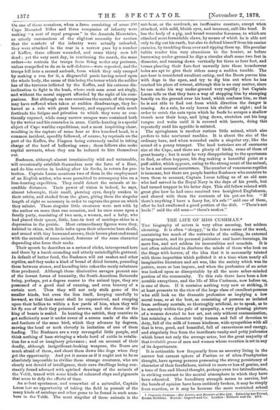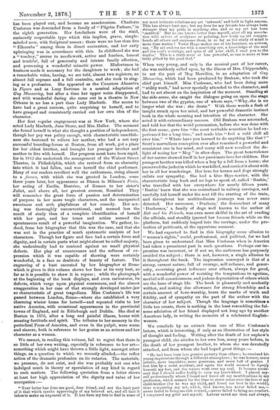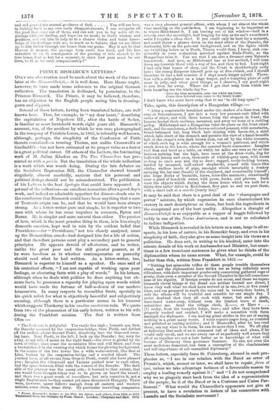THE LIFE OF MISS CUSHMAN.*
THE biography of actors is very often amusing, but seldom elevating. It is often " shoppy," in the lower sense of the word, containing too much of the outworks of the calling, its external arrangements, and its personal jealousies and heart-burnings, its mere fun, and not seldom its immoralities and scandals. It is not often calculated to disabuse the minds of those who look on the Stage with horror, of the idea that it is necessarily tainted with those impurities which polluted it at a time when nearly all imaginative literature and art was, like the society which was its patron, more or less impure, and when the profession of an actor was looked upon as disreputable by all the more sober-minded portion of the community. To this rule there have been a few notable exceptions, and the life of Mies Cushman, now before us, is one of them. If it contains nothing very new or striking, it at least presents to the view of the large class of excellent persons who still look on the dramatic profession as implying a low moral tone, or at the best, as consisting of persons so isolated from ordinary mortals, so thoroughly artificial, so to speak, as to be scarcely within the pale of sympathy, a very pleasing picture of a woman devoted to her art, not only without contamination, but retaining a character truly human and full of devotion to duty, full of the milk of human kindness, wide sympathies with all that is true, good, and beautiful, full of earnestness and energy, and singularly free from the inordinate vanity and petty jealousies which beset not only the average actor, but the great majority of that irritabile genus of men and women whose vocation is art in any of its departments.
It is noticeable how frequently from an ancestry living in the narrow but earnest sphere of Puritan or of ultra-Presbyterian thought, have sprung persons possessing the strong persistency of character of their forefathers, united to more or less of genius, and a tone of free and liberal thought, perhaps even too latitudinarian, in striking contrast to the mental atmosphere in which they have been educated. The hereditary strength seems to survive, but the bonds of opinion have been suddenly broken, it may be simply from reaction, or it may be because the more restricted school
* Charlotte Cushman : Her Letters, and Memoirs of Her We. Edited by her Friend, Emma Stebbins. Boston : Osgood and Co. London : Trlibner and Co. 1878. has been played out, and become an anachronism. Charlotte Cushman was descended from a family of "Pilgrim Fathers," in the eighth generation. Her forefathers were of the staid, eminently respectable type which this implies, grave, simple- minded men, with Scriptural names ; there were no less than five 4' Elkanahs" among them in direct succession, and her early upbringing was in accordance with this. In childhood she was a "tomboy," averse to needlework, active and fearless, honest and truthful, full of generosity and intense family affection, and possessing a wonderful mimetic power. Misfortunes in business made it necessary for the daughters to work ; she had a remarkable voice, having, we are told, almost two registers, an almost full soprano and a full contralto, and she took to sing- ing as a profession. She appeared as the Countess Almaviva in Figaro and as Lucy Bertram in a musical adaptation of Guy Mannering, but after a time her upper voice disappeared, and with wonderful daring she came out in a theatre in New Orleans in no less a part than Lady Macbeth. She seems to have had a great success, quite surprising to herself, and to have grasped and consistently carried out her own idea of the character.
Her first regular engagement was at New York, where she acted Lady Macbeth, Jane Shore, and Mrs. Haller. The moment she found herself in what she thought a position of independence, though her pay was paltry enough, with characteristic unselfish- ness she hastened to relieve her mother, who bad a not very successful boarding-house at Boston, from all work, got a place for her eldest brother, and brought her younger brother and mother to live with herself. Her progress must have been rapid, for in 1842 she undertook the management of the Walnut Street Theatre, in Philadelphia, which she revived from an obscurity into which it had fallen, and was herself the chief performer. Many of our readers recollect well the enthusiasm, rising almost to a furore, with which she was greeted in London, some three years later, her appearance as Bianca in Milman's Fazio, her acting of Emilia, Beatrice, of Romeo to her sister's Juliet, and above all, her greatest success, Rosalind They will remember the great force of passion and determination of purpose in her more tragic characters, and the unexpected sweetness and arch playfulness of her comedy. Her act- ing was thoroughly unconventional, and seemed less the result of study than of a complete identification of herself with her part, and her tones and action seemed the spontaneous result of a powerful imagination. We gather, in- deed, from her biographer that this was the case, and that she was not in the practice of much systematic analysis of her characters. Though her figure and face had a certain force and dignity, and in certain parts what might almost be called majesty, she undoubtedly had to contend against no small physical defects. Her play of countenance and the softness of ex- pression which it was capable of showing were certainly wonderful, in a face so destitute of beauty of feature. The engraving of a bust executed by her biographer at Rome which is given in this volume shows her face at its very best, so far as it is possible to show it in repose ; while the photograph at the beginning of the book displays, and even caricatures, its defects, which verge upon physical coarseness, and the almost exaggeration in her case of that strongly developed under-jaw so characteristic of great tragedians. Miss Caiman's life was passed between London, Rome—where she established a very charming winter home for herself—and repeated visits to her native America, with occasional appearances in the provincial towns of England, and in Edinburgh and Dublin. She died at Boston in 1876, after a long and painful illness, borne with amazing fortitude and spirit. The tributes to her memory in the periodical Press of America, and even in the pulpit, were warm and sincere, both in reference to her genius as an actress and her character as a woman.
We cannot, in reading this volume, fail to regret that there is so little of her own writing, especially in reference to her art— something which might have thrown a little light, amongst other things, on a question to which we recently alluded,—the reflex action of the dramatic profession on its votaries. The materials, we presume, do not exist, and she was probably not one who indulged much in theory or speculation of any kind in regard to such matters. The following quotation from a letter shows at lead her high appreciation of the dignity and value of her occupation :— "Your letter has done me good, dear friend, and not the least part of it that which speaks approvingly of my beloved art, and all that it takes to make an exponent of it. It has been my fate to find in some of
'my most intimate relations my art 'tabooed,' and held in light osteein. This has always hurt me ; but my love for my friends has always been stronger than my pride in anything else, and so my art has been 'snubbed.' But no one knows better than myself, after all my associa- tion with artists of sculpture or painting, bow truly my art compre- hends all others and surpasses them, in so far as the study of mind is more than matter! Victor lingo makes one of his heroines, an actress, say, My art endows me with a searching eye, a knowledge of the soul and the soul's workings, and spite of all your skill, I read you to the depths.' This is a truth more or lose powerful, as one is more or loss truly gifted by the good God."
When very young, and only in the musical part of her career, she was suddenly called upon, by the illness of Mrs. Chippendale, to act the part of Meg Merrilies, in an adaptation of Guy Mannering, which had been produced by Braham, who took the chief part himself. Miss Cushman, who had been doing mere "utility work," had never specially attended to the character, and had to act almost on the inspiration of the moment. Standing at the side-scene, she caught the dialogue going on upon the stage between two of the gypsies, one of whom says, "Why, she is no longer what she was ; she doats." With these words a flash of insight struck upon her mind, and her powerful dramatic instinct took in the whole meaning and intention of the character. She acted it with extraordinary success. Old Bratiam was astounded, and told her that the weird personation, before she was done with the first scene, gave him "the most veritable sensation he had ex- perienced for a long time," and made him "feel a cold chill all over him." "Where have you learned to do anything like that ?"
Scott's marvellous conception ever after remained a powerful and consistent one in her mind, and many will now recollect the de- light of seeing her " Meg" in after-days. The great benevolence of her nature showed itself in her passionate love for children. Her youngest brother was killed when a boy by a fall from a horse; she preserved the jacket in which he was killed, and carried it about with her in all her wanderings. IIer love for horses and dogs strongly enlists our sympathy. She had a blue Skye-terrier, with the characteristic long back and no legs to speak of, called ' Bushie,' who travelled with her everywhere for nearly fifteen years. Bushie' knew that she was contraband in railway carriages, and carefully hid herself under the seat till the starting of the train, and throughout her multitudinous journeys was never once detected. Her successor, ' Duchess,' the descendant of many Duchesses,' a family of dogs well known to the author of flab and his Friends, was even more skilful in the art of evading the officials, and steadily ignored her human friends while on the platform, but suddenly leaped into the carriage, under the pro- tection of petticoats, at the opportune moment.
We had expected to find in this biography some allusion to "women's rights," social, professional, and political, for we had been given to understand that Miss Cushman when in America had taken a prominent part in such questions. Perhaps our im- pression was incorrect, or if not so, the authoress has purposely
avoided the subject ; there is not, however, a single allusion to it throughout the book. The impression conveyed is that of a strong, earnest nature, full of courage, self-reliance, and gener- osity, exercising great influence over others, always for good, with a wonderful power of resisting the temptations to egotism, morbid self-consciousness, and jealous depreciation of others which are the bane of stage life. The book is pleasantly and modestly written, and making due allowance for strong friendship and a certain amount of hero-worship, bears the marks of truth and fidelity, and of sympathy on the part of the author with the character of her subject. Though the language is sometimes a little too ornate, there is nothing in the least resembling the ful-
some adulation of her friend displayed not long ago by another American lady, in writing the memoirs of a celebrated English- woman.
We conclude by an extract from one of Miss Cuahman's letters, which is interesting, if only as an illustration of her style of thought and feeling. Writing after the death of her nephew's youngest child, she alludes to her own loss, many years before, in the death of her youngest brother, to whom she was devotedly attached, and from whom she had hoped great things :—
" He had been born into greater poverty than others; ho received his young impressions through a different atmosphere ; ho was keener, more artistic, more impulsive, more generous, and more full of genius. I lost him by a cruel accident, and again tho world seemed to liquefy beneath my feet, and the waters went over my soul. It became neces- sary that I should suffer bodily to cure my heart-bleed. I placed my- self professionally where I found and know all my mortifications in my profession, which seemed for the time to strew ashes over the loss of my child-brother (for he was my child, and loved me best in tho world), thus conquering my art, which, God knows, has never failed me,— never failed to bring me rich roward,—never failed to bring me comfort. I conquered my grief and myself. Labour saved me then and always,
and so I proved the eternal goodness of God You will see how,
in looking back to my own early disappointments, I can recognise all the good that came out of thorn, and can ask you to lay aside all re- pipings with our darling, and hope (as we must) in God's wisdom and goodness, and ask him to help us to a clearer vision and truer know- ledge of his dealings with us; to teach us to believe that we are lifted up to him baiter through our losses than our gains. May it not be that Heaven is nearer, the passage from earth less hard, and life less seductive to us, in consequence of the passing of this cherub to its true home, lent us but for a moment, to show how pure must be our lives, to fit us for such companionship ?"




































 Previous page
Previous page